Complicating Patriarchy
When I was a child, we had a medium-sized ceramic figurine of a rabbi in our house. Old and wizened, sporting a long grey beard and dark robes, he looked appropriately pious. And as a young boy who was still learning about Judaism via synagogue services, Sunday school, and rudimentary Hebrew classes, in my mind the figurine was, despite clear prohibitions against idolatry, my concept of what God looked like.
God as father. God as judge. God as powerful. God as man. While I knew intellectually that God wasn’t really an old man in the sky, the fact that biblical and other narratives typically gender and reinforce God as male (George Burns in the movie Oh, God! Anyone? Anyone?) led to this conclusion for me. Judaism—and it is clearly not unique among religions in this regard—is a rather androcentric and yes, patriarchal religion.
And yet, while patriarchy is often conceived of and discussed as a binary system of oppressor and oppressed, male and female, father and mother, husband and wife, as some of the articles in this issue of Perspectives reveal and indeed as work by emerging scholars such as those in the AJS’s newly formed Gender and Sexuality Studies Group uncovers, gender, sexuality, and power are often multiple, nonbinary, and, I would argue, contextual categories.
Take, for example, the histories of Jewish masculinity by AJS members Sarah Imhoff,i Beth Wenger, and Daniel Boyarin,ii which have examined the ways in which the gender of Jewish men reads differently depending on the time period, country, or culture in which those individuals lived. Such men might still be patriarchs and women might still play a subservient role to them, but in a larger hierarchy, depending on the context, Jewish men may read as less powerful, even weak, compared to their non-Jewish counterparts. That observation isn’t meant to invalidate Jewish patriarchy or condone men’s inappropriate behavior toward women, but it does complicate the binary.
Along those lines, many recent theorists remind us that identities are intersectional. Consequently, how do we understand the role of patriarchy vis-à-vis gay men or transmen? Such individuals arguably occupy other strata of maleness and masculinity, which further challenges how we conceive of patriarchy. Some of these individuals might even find themselves to be the oppressed and oppressor at the same time.
All this is not to negate the notion that patriarchy has and continues to have detrimental, violent, and painful effects on many members of our community, as a number of the articles in this issue reveal. From unfair job discrimination to unwanted comments about appearance to sexual assault, patriarchy has a very real, very deeply felt impact on women. And for those of us who identify as “men,” and I put this category in scare quotes because it, like “women,” is a more fluid category than we often think, there is still work to be done to address inequality. Even those of us who identify as allies and feel we may be doing the “right thing” vis-à-vis gender equality may not realize the ways in which we may still be blind or even unconsciously supportive of institutionalized patriarchy, those systems that place and keep women on a lower rung than men. These are issues that the AJS’s leadership are thinking very seriously about and working to address. Is there gender diversity at the conference in panel makeup? In board composition? In committee makeup? While perfect equity has not always been achievable, it’s a goal to strive for.
Hopefully no matter what your gender or sexuality is, the articles in this issue will be thought provoking. You might identify with some of them as a victim, being reminded of something that happened to you; as a knowing (or unknowing) perpetrator; or as a bystander, watching on the sidelines, who has not yet spoken up to help change the system. The articles here are meant to stir reflection and awaken us to the ways in which the complicated and uneven systems of gender, sexuality, and power operate in this world. We have to make sure that AJS members are treated equally and fairly, with decency and respect, able to perform their work as scholars, teachers, and researchers without fear, anxiety, or threat, and until all that is fully achieved, we have work to do.
Warren Hoffman
Association for Jewish Studies
i Sarah Imhoff, Masculinity and the Making of American Judaism (Bloomington: Indiana University Press, 2017).
ii Daniel Boyarin, Unheroic Conduct: The Rise of Heterosexuality and the Invention of the Jewish Man (Berkeley: University of California Press, 1997).

